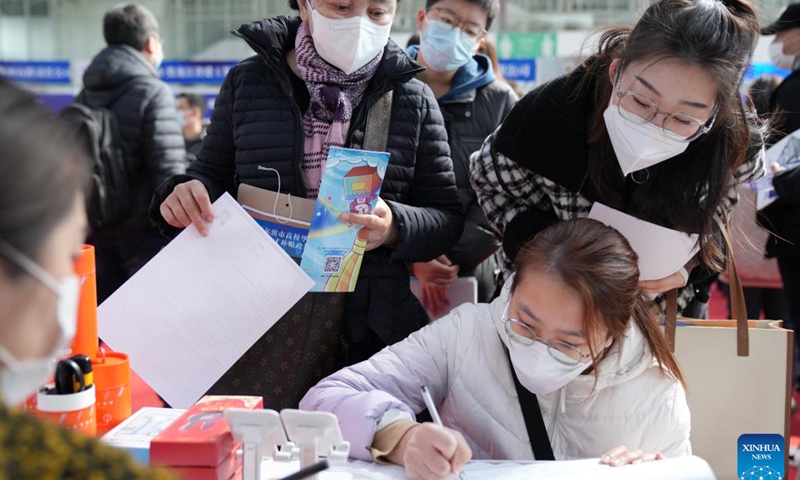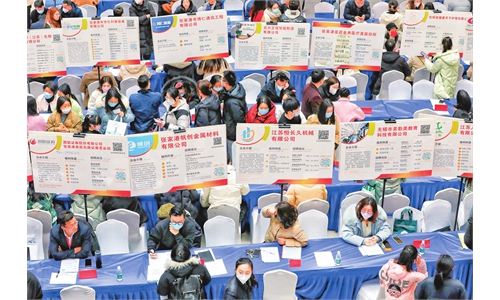
A job seeker (R front) fills in a form for employment at a job fair in Harbin, northeast China's Heilongjiang Province, March 18, 2023. More than 500 on-line and off-line recruiting events have been scheduled during this job fair, the largest of its kind in recent years held in the province, offering over 115,000 vacant positions in total. (Photo:Xinhua)
Local authorities across China are rolling out policies to help college graduates find jobs.
As implementation of the national education ministry's proposal in May, the education authority of Central China's Henan Province has kicked off a local 100-day sprint from May to August with specific measures to help this year's college graduates find jobs, local media reported on Wednesday.
The plan orders local colleges to provide specific guidance and take effective measures to help this year's graduates who lack internship experience due to the COVID-19 pandemic in the past three years.
Local colleges should hold special events for demobilized college student soldiers to find jobs and actively organize graduates to participate in online recruitment activities. They are also asked to provide timely recruitment information of small and medium-sized companies and the e-commerce industry to the students, according to media reports.
The plan requires local colleges to help arrange exams for some posts in civil service departments and state-owned companies, as well as some vocational qualification examinations, and ensure that these exams are completed by the end of August. Recruitment for grassroots posts such as doctors in villages, teachers in special positions and those who support rural revitalization is also stressed in the plan.
According to the requirements of the national education ministry, the plan told administrators of local colleges with employment rates lower than the provincial level in 2022 to explore at least 100 new employers.
Officials of newly established colleges should visit at least 100 employers in order to help their graduates find more job opportunities.
A record high 11.58 million graduates are reportedly set to enter the workforce in 2023, posing employment pressure to these fresh job seekers.
A higher level of postgraduates this year has also pushed up the competition. According to the Beijing education authority, 296,000 college students in Beijing are expected to graduate this summer, and 160,000 will have postgraduate degrees.
According to a report of Chinese job-hunting platform Zhilian Zhaopin published in early May, this year's graduates started job-hunting earlier than last year's. The ratio of those who started to seek jobs in January increased by 2.5 percentage points compared with last year and those in February climbed by 4.5 percentage points compared with last year.
Wang Yuechen, a postgraduate student in her final year of studying advanced translation at Beijing Foreign Studies University, told the Global Times on Wednesday that she hoped to work in a company, but she could not pass the resume screening as she lacked relevant experience. She later chose to become a civil servant, and passed the exams.
China's economy is still undergoing a recovery process, and many domestic companies have not fully recovered from the damage of the COVID-19 pandemic, according to Zhou Haiwang, deputy director of the Institute of Population and Development under the Shanghai Academy of Social Sciences.
The key to solving the problem in employment is to resume economic growth. As long as the growth of China's GDP can reach 5 percent as expected, the pressure on the job market would largely ease accordingly, according to Zhou.
Despite the tough situation, experts expressed confidence in the stability of domestic employment, given the active moves of Chinese authorities at various levels to help young people find jobs. Many preferential policies have been issued to help students find jobs or start their own businesses in emerging industries, such as the digital economy or flexible job market.
China's State Council, the cabinet, in April announced measures aimed at stabilizing the employment situation, including providing at least 1 million youth internship positions, increasing financial support for small businesses and encouraging state-owned enterprises to expand recruitment.
Beijing and South China's Hainan Province have upgraded local government services for employees in the flexible job market, while Northwest China's Shaanxi and Central China's Hubei Provinces focused on assisting key groups starting their own businesses.


